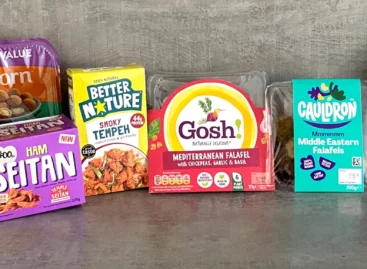Magazine: Sustainable, personal, and healthy – this is what we want from groceries in 2021
Does milk grow on trees now?
2020 was a year when safety became the driving force in shopping practically overnight. Such technological transformations occurred in just a couple of weeks which would have taken years otherwise. Plant-based food products became popular very quickly all over the world. The prediction is that by 2024 this food category will expand by about 10-20 percent. Consumers are getting to like food made of plants because they are healthy, they bring diversity to one’s diet, they are sustainable and tasty – at least this is what a survey conducted by Innova has found. People aren’t satisfied with the current selection of plant-based food available in shops: they want new products and this can speed up the growth of the category. Another trend is that 60 percent of consumers want to have food and drinks that strengthen the immune system.
The whole world wants to protect the environment
After a short absence sustainability has returned to the spotlight: 65 percent of consumers would like their daily activities to have a positive influence on our environment. Lux Research’s The Food Company of 2050 list identifies 6 areas that companies will concentrate on in the next 30 years and sustainability is one of these. Caring more about the environment makes consumers turn to renewable sources of food such as algae, seaweed, pulses and various cereals. Innova opines that the leading trend of 2021 is going to be transparency, because it strengthens consumer trust.

60 per cent of the consumers worldwide want consume food and drinks that support the immune system
Hybrid: The golden mean
What other food and dietary trends are likely to prevail in 2021? According to a forecast by Healthline Media, consumers will prefer eating habits that give them greater flexibility between meals. The era of flexitarian consumers and hybrid diets has dawned: it isn’t quick solutions that matter anymore, but the long-term positive health effect of groceries. A food product scores extra points if it also has sustainable and functional characteristics. Since consumers want to reduce their carbon footprint now, they cut down on their meat consumption and start buying local products. People realise the benefits of home cooking, because they would like to control what and when they are eating, and how their food is prepared.

The era of flexitarian and hybrid diets has come: it is no more the fast solutions that count but their impact on health on the long run
Green and diverse!
It is needless to say that innovation work in the field of food and drinks won’t stop. Immune system strengthening products and plant-based alternatives will be important innovation directions. Good examples of the former are Immune orange juice by Uncle Matt and a high probiotic content yogurt range by Chobani. Sales of plant-based food products broke every record in 2020. A Nielsen survey has revealed that meat alternative sales soared by 129 percent last year if compared with the first nine months of 2019. As for dairy product alternatives, soy and almond milk used to dominate, but today oat, quinoa, hemp and macadamia nut milks are also available.

Consumers long for options that are tailored to their own personal lifestyle
Demand is also on the rise for global flavours. The most popular are those food types that are authentic and have their own story. At the top of the popularity ranking we find matcha, moringa, elderberry, cinnamon and rhubarb. These days gene technology promises cheaper food faster than before, which also tastes and looks better than in the past. In 2021 gene-modified vegetables, cereals and fruits will have a stronger presence in the world’s food market than ever before.

On stage: global tastes and food improved by means of technology
From a clean source only, mindfulness and the health trend
Food trend specialist Innova Market Insights has published its annual trend report, which also names transparency as the biggest trend. Innova says 6 from 10 consumers care about where the food they buy come from – from both an ethical and an environmental perspective. Those brands can be the winners in this environment that take into consideration the cleanliness of food, the well-being of humans and animals, the transparency of supply chains, the sustainable sources of food ingredient and plant-based nutrients.

Digital devices are gaining ground that give rise to innovative solutions and transparency in the entire supply chain
According to a forecast by Agrana, one of the most important trends this year is acting for the benefit of the future. The company’s survey has found that 45 percent of consumers changed their eating habits in the spirit of a more sustainable lifestyle. 64 percent of respondents said they became more conscious about their health and immune system last year. Prevention, well-being, mindfulness and being natural are new elements of the consumer behaviour. Agrana also calls attention to the importance of control, which can help consumers in making their very complex lives easier, assisting them with smart solutions in their lifestyles and diets. //
Shopper Navigator from GfK for the new era
Shopper Navigator, a new programme by GfK claims: if you know how shopping habits changed during the pandemic, you can navigate with confidence in the period of the New Normal. The Shopper Navigator can be great help for retailers, because it combines research data with actual shopper behaviour, and by doing so it can define credible shopping patterns that make it possible to get the most accurate and complete picture about customers.

Hunger games á la Covid
In September 2020 GfK did a survey in 16 European countries with approximately 70,000 participants. GfK divided 2020 into four periods, Pre-covid Period (January-February), Panic Period (March), Adaptation Period (April-June) and New Normal Period (starting in August). The company also identified three different crisis groups: Affected, Worrying and Resisting consumers.
From the 16 countries analysed, in the Netherlands only 14 percent belonged to the Affected category, 22 percent were Worrying and 64 were Resisting consumers. The highest number of Affected consumers can be found in Hungary, Serbia and Romania. We can also learn from the study that one-store buying is still a dominant trend, and shoppers visit stores that are close to where they live if possible. //
Related news
Fashion, drones and sustainability – the new face of agriculture at the AgriTech InnoExpo event
🎧 Hallgasd a cikket: Lejátszás Szünet Folytatás Leállítás Nyelv: Auto…
Read more >High-value shopping basket and more conscious shoppers: growing demand for domestic and healthy products
🎧 Hallgasd a cikket: Lejátszás Szünet Folytatás Leállítás Nyelv: Auto…
Read more >Related news
The Store of the Future opens again at the SIRHA Budapest exhibition! (Part 1)
🎧 Hallgasd a cikket: Lejátszás Szünet Folytatás Leállítás Nyelv: Auto…
Read more >The impact of the forint exchange rate on GDP growth
🎧 Hallgasd a cikket: Lejátszás Szünet Folytatás Leállítás Nyelv: Auto…
Read more >








